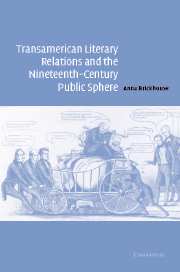Book contents
- Frontmatter
- Contents
- Acknowledgments
- Note on texts and translations
- Prologue
- 1 Introduction: transamerican renaissance
- 2 Scattered traditions: the transamerican genealogies of Jicoténcal
- 3 A francophone view of comparative American literature: Revue des Colonies and the translations of abolition
- 4 Cuban stories
- 5 Hawthorne's Mexican genealogies
- 6 Transamerican theatre: Pierre Faubert and L'Oncle Tom
- Epilogue
- Notes
- Index
5 - Hawthorne's Mexican genealogies
Published online by Cambridge University Press: 22 September 2009
- Frontmatter
- Contents
- Acknowledgments
- Note on texts and translations
- Prologue
- 1 Introduction: transamerican renaissance
- 2 Scattered traditions: the transamerican genealogies of Jicoténcal
- 3 A francophone view of comparative American literature: Revue des Colonies and the translations of abolition
- 4 Cuban stories
- 5 Hawthorne's Mexican genealogies
- 6 Transamerican theatre: Pierre Faubert and L'Oncle Tom
- Epilogue
- Notes
- Index
Summary
THE MANY TONGUES OF “YANKEELAND”
In the preface to Nathaniel Hawthorne's 1844 tale “Rappaccini's Daughter,” the narrator presents the text satirically as a translation, a piece in English whose mysterious French original was ostensibly penned in a “shadowy, and unsubstantial” style by “M. de l'Aubépine.” The name “Aubépine” is itself a translation of Hawthorne's name, given to the author by a French tutor and companion while he was visiting his friend Horatio Bridge in Augusta, Maine, in 1837. During this visit with Bridge, Hawthorne reported in his journal that he was struck by the “intermixture of foreigners” in “Yankeeland”: the “strange” sounds of “children bargaining in French,” the “hovels of … wild Irish, scattered about as if they had sprung up like mushrooms … where the roots of an old tree are hidden under the ground.” Apparently taken with the intercultural developments he described, Hawthorne appropriated the name “Aubépine” for himself, using it afterwards in several letters to his wife Sophia.
Later during the visit to Maine, Hawthorne recorded a fascinating conversation with the tutor in which this “queer little Frenchman” alleges that he has “never yet sinned with a woman,” despite “his residence in dissolute countries,” various wild outland sites of the New World (32, 46). Hawthorne purports to take the foreign tutor at his word on this putative chastity, though his journal notes wryly that the Frenchman proves “greatly delighted with any attention from the ladies” (57).
- Type
- Chapter
- Information
- Publisher: Cambridge University PressPrint publication year: 2004

